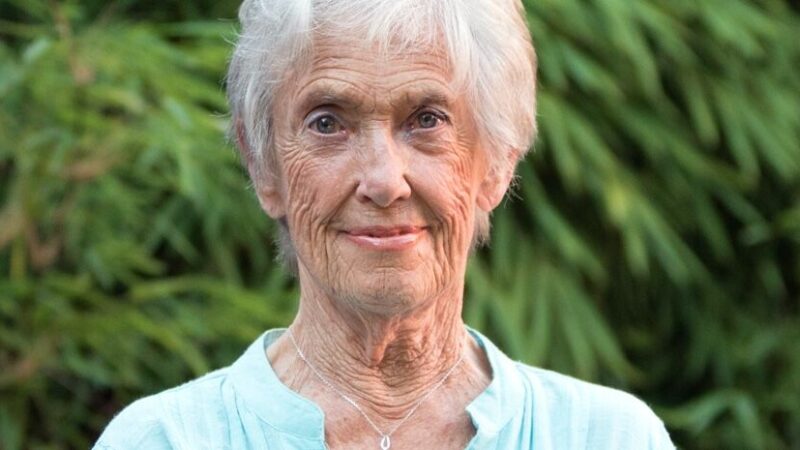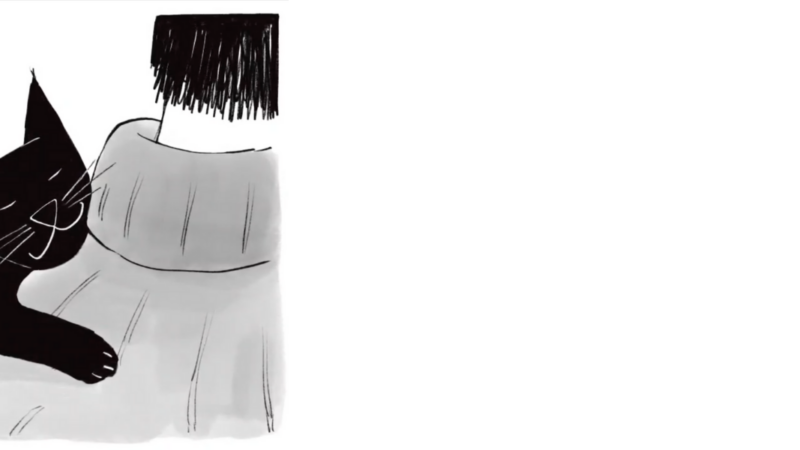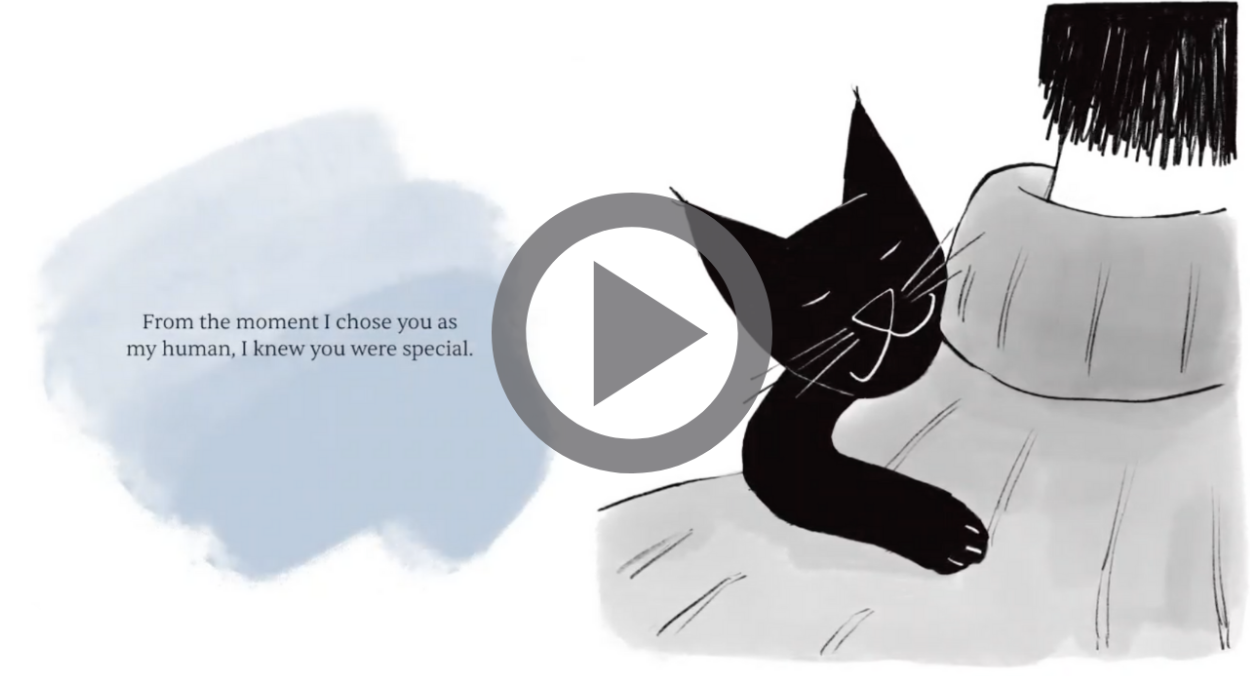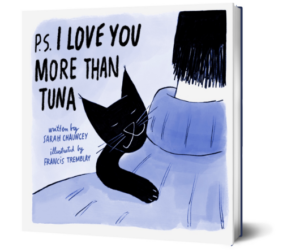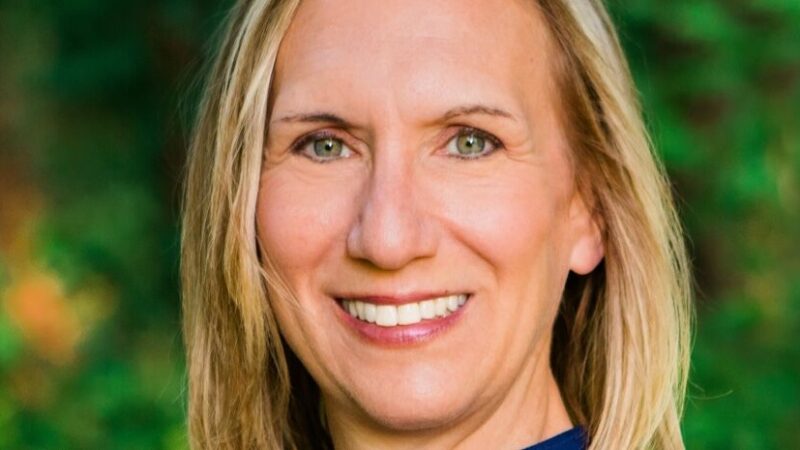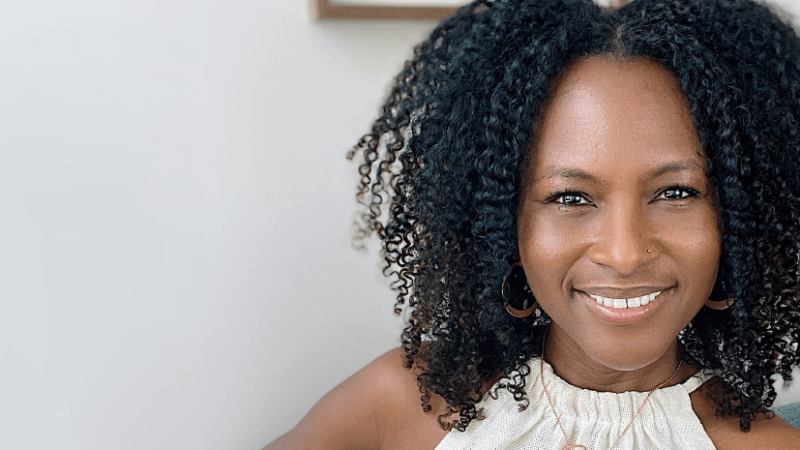-
E117: The Real Work: Letting Go from Within
Michael Singer — October 2, 2025
True spirituality isn’t about mystical experiences or lofty ideals—it’s about honestly facing...
-
Once More: Reflections on Reincarnation and the Gap Between Lives
Tami Simon — September 26, 2025
In this special reflection episode of Insights at the Edge host Tami Simon looks back on her...
-
Honey Tasting Meditation: Build Your Relationship with Sweetness
There is a saying that goes “hurt people hurt people.” I believe this to be true. We have been...
Written by:
Amy Burtaine, Michelle Cassandra Johnson
-
Many Voices, One Journey
The Sounds True Blog
Insights, reflections, and practices from Sounds True teachers, authors, staff, and more. Have a look—to find some inspiration and wisdom for uplifting your day.
Standing Together, and Stepping Up
Written By:
Tami Simon -
The Michael Singer Podcast
Your Highest Intention: Self-Realization
Michael Singer discusses intention—"perhaps the deepest thing we can talk about"—and the path to self-realization.
This Week:
E116: Doing the Best You Can: The Path to Liberation -
Many Voices, One Journey
The Sounds True Blog
Insights, reflections, and practices from Sounds True teachers, authors, staff, and more. Have a look—to find some inspiration and wisdom for uplifting your day.
Take Your Inner Child on Playdates
Written By:
Megan Sherer
600 Podcasts and Counting...
Subscribe to Insights at the Edge to hear all of Tami's interviews (transcripts available, too!), featuring Eckhart Tolle, Caroline Myss, Tara Brach, Jack Kornfield, Adyashanti, and many more.
Most Recent
Joanna Macy: We Belong: Hope, Choice, and Our Relation...
Dr. Joanna Macy is an ecophilosopher, activist, and Buddhist scholar who has been at the forefront of movements for social justice and environmentalism for more than five decades. She founded the Work That Reconnects Network and has written many books, including World as Lover, World as Self. In this episode of Insights at the Edge, Tami Simon speaks with Joanna about hope in times of chaos and dissolution, as well as how hope is something we do rather than just feel. Joanna and Tami discuss apathy as a refusal to face the inevitability of suffering and why the state of the environment can be especially heartbreaking. Finally, Tami and Joanna talk about our relationship with the earth as a natural birthright—one that is actually the source of all our energy and joy.
Being Witnessed In Grief Is A Powerful Balm For Healin...
Dear friends,
Two days after my cat, Hedda, died in 2016, my friend Francis sent me a sketch with a note “from” Hedda that read, in part, “P.S. I love you more than tuna.” Through my tears, I thought that would be a great book title. I had a clear vision: an illustrated gift book that people would give to friends, family, colleagues, or clients after the loss of their cat. A step beyond a sympathy card, this would be the first “empathy book” for adults grieving the loss of a cat.
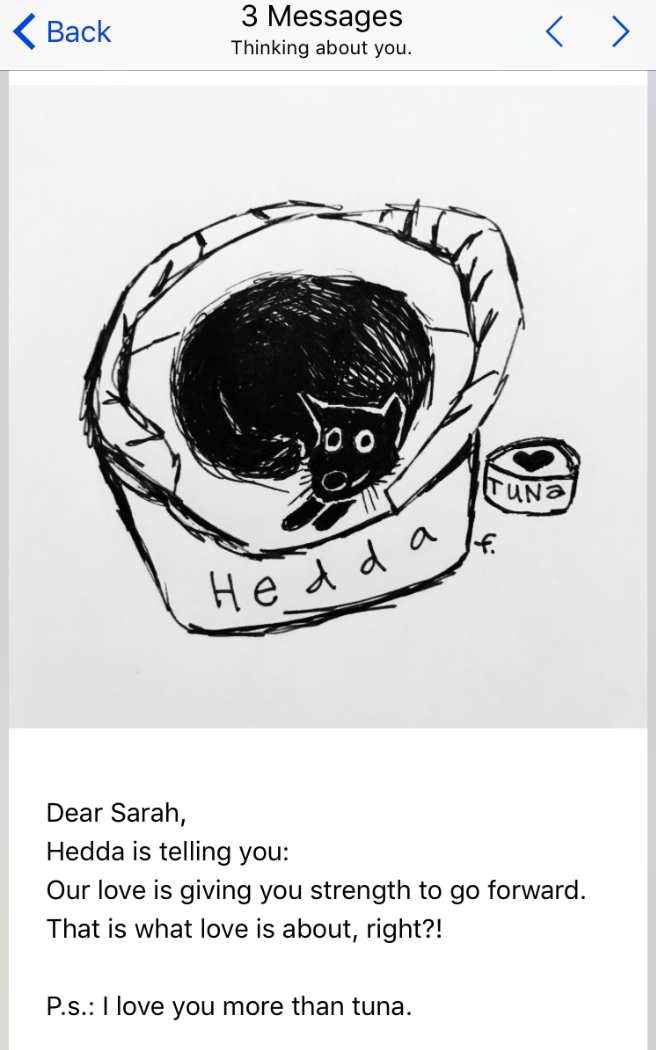
Inspired in part by Eckhart Tolle and Patrick McDonnell’s Guardians of Being and Charles M. Schultz’s Happiness is a Warm Puppy, P.S. I Love You More Than Tuna offers comfort and inspiration through New Yorker-style drawings and simple, evocative language. My goal was to make it heartfelt without being cloying.
Every year, six million Americans and Canadians must say a final goodbye to their cats—buddies who leapt into their hearts as kittens, purred away heartbreak through multiple breakups, snuggled by their side in homes large and small, and occasionally deleted folders of work by stretching out on a warm keyboard.
“Pet loss” is considered a disenfranchised form of grief; it’s not culturally sanctioned. We don’t have any universal rituals for this grief, like sitting shiva or holding a wake. This often leaves the bereaved feeling isolated and misunderstood, which compounds the grief and makes healing more difficult.
People grieving companion animals have a need to be seen, their grief validated. Being witnessed in grief is a powerful balm for healing.
Friends of those grieving companion animals are often at a loss for ways to show their support. P.S. I Love You More Than Tuna gives all of us the opportunity to make a profound impact with a simple gesture.
When Francis sent me the sketch and note, I felt seen. Francis’s gift acknowledged the bond I’d had with Hedda and my grief at her death. The present tense of the note also reminded me that Hedda was still with me, even if I couldn’t see her. That was significant in terms of helping me heal, and that’s the comfort I hope P.S. I Love You More Than Tuna will provide to other cat lovers.
Sounds True has created a lovely video preview for P.S. I Love You More Than Tuna. I hope you’ll check it out below.
Ultimately, I hope this book will benefit the world in multiple ways: for the recipient, witnessing and healing; for the giver, a tangible action they can take to help another; for Best Friends Animal Society, to which I’m donating 10 percent of my proceeds, contributing to their work of keeping pets in the home. This includes helping low-income people connect with resources they need to feed, train, and care for their companion animals. And of course, I hope this will benefit Sounds True and their work in the world, which is quickly becoming more needed than ever.
Take care,
Sarah Chauncey
Elizabeth Stanley: Trauma-Sensitive Mindfulness
Elizabeth Stanley is a Georgetown University professor and the creator of Mindfulness-based Mind Fitness Training (MMFT)®, an approach taught to thousands in civilian and military high stress environments. A U.S. Army veteran with service in Asia and Europe, she holds degrees from Yale, Harvard, and MIT. She is the author of the book, Widen the Window: Training Your Brain and Body to Thrive During Stress and Recover from Trauma. In this podcast, Tami Simon speaks with Elizabeth Stanley about her 8-session online course, Mindfulness-Based Mind Fitness Training: A Trauma-Sensitive Online Course to Build Resilience and Thrive During Stress. They also discuss why MMFT is a practice we can all benefit from; the value of expanding our “window of tolerance”; the relationship between personal agency and trauma; the “thinking” brain versus the “survival” brain; when stress becomes trauma; the importance of recovery from stressful situations; and more.
Customer Favorites
Coffee Meditation

During the twenty years I lived in a meditation center, I rushed through my morning coffee. After all, if I didn’t drink it fast enough, I’d be late for meditation. It was important to get to meditation on time; otherwise, one had to endure the social stigma of being late (obviously lacking the proper spiritual motivation), as well as the boredom and frustration of having to wait outside the zendo to meditate until latecomers were admitted.
When I moved out of the center, I had to learn to live in the world. I had been institutionalized for nearly twenty years. Now I was out and about. What did it mean? There was no formal meditation hall in my home. I could set my meditation cushion in front of my home altar, or I could sit up in my bed and cover my knees with the blankets. There were no rules.
Soon, I stopped getting up at 3:30 am. Once I did awaken, I found that a hot shower, which had not really fit with the previous circumstances, was quite invigorating. Of course, getting more sleep also helped.
Then I was ready for coffee—hot, freshly brewed, exquisitely delicious coffee. Not coffee in a cold cup from an urn; not coffee made with lukewarm water out of a thermos; not coffee with cold milk, 2 percent milk, or nonfat milk—but coffee with heated half-and-half. Here was my opportunity to satisfy frustrated longings from countless mornings in my past. I would not have just any old coffee, but Peet’s Garuda blend—a mixture of Indonesian beans—brewed with recently boiled water and served in a preheated cup.
Unfortunately, by the time I finished the coffee, I had been sitting around so long that it was time to get started on the day, but I hadn’t done any meditation. With this heavenly beverage in hand, who needed to meditate?
The solution was obvious: bring the ceremoniously prepared coffee in the preheated cup to the meditation cushion. This would never have been allowed at the center or in any formal meditation hall I have visited, but in my own home, it was a no-brainer. Bring the coffee to the cushion—or was it the other way around?
I light the candle and offer incense. “Homage to the Perfection of Wisdom, the Lovely, the Holy,” I say. “May all beings be happy, healthy, and free from suffering.” I sit down on the cushion and place the coffee just past my right knee. I cross my legs and then put the cup right in front of my ankles. I sit without moving so I don’t accidentally spill the coffee. I straighten my posture and sip some coffee.
I feel my weight settling onto the cushion, lengthen the back of my neck, and sip some coffee. Taste, enjoy, soften, release. I bring my awareness to my breath moving in, flowing out. If I lose track of my breath, I am reminded to take another sip of coffee—robust, hearty, grounding. Come back to the coffee. Come back to the breath.
A distraction? A thought? Sip of coffee. Enjoy the coffee. Enjoy the breath. Focus on the present moment. Remembering the words of a Vipassana teacher of mine: “Wisdom in Buddhism is defined as the proper and efficacious use of caffeine.”
I stabilize my intention. “Now as I drink this cup of coffee, I vow with all beings to awaken body, mind, and spirit to the true taste of the dharma. May all beings attain complete awakening at this very moment. As I visualize the whole world awakening, my mind expands into the vastness.
Friends, this is one of the teaching stories that is shared in my new book, The Most Important Point. This offering comes to you with my gratitude for the efforts of Danny S. Parker, who edited over 60 of my Zen talks for inclusion in this volume.
Lastly, I invite you to try the Tea and Ginger Muffins recipe that accompanies this story. Danny must have enjoyed them!

Edward Espe Brown is a Zen Buddhist priest and was the first head cook at Tassajara Zen Mountain Center.
Danny S. Parker is a longtime student of Brown’s and is an ordained Zen Buddhist priest.

Pick up a copy of Edward Espe Brown’s newest book, The Most Important Point, today!
Spiritually Fly
Faith Hunter has nearly 20 years of experience as a yoga and meditation teacher. She is the founder of Embrace Yoga DC and Embrace OM, as well as the creator of Spiritually Fly, a lifestyle philosophy that celebrates our inherent vibrancy and worth. With Sounds True, Faith has written a new book called Spiritually Fly: Wisdom, Meditations, and Yoga to Elevate Your Soul. In this episode of Insights at the Edge, Tami Simon speaks with Faith about what it means to be Spiritually Fly and how we can all live an authentic, joyful life of spiritual flyhood. They discuss the life-changing effect yoga had on Faith’s life and the courageous way she empowered herself to blend classic yoga lineages with sound, ritual, and African traditions to create a practice that is true to her. And Faith describes the “golden glitter”—the inner brilliance—that lies beneath our fear, shame, and other “demons,” waiting to be released into the world.
Linda Howe: Reading the Akashic Records
Tami Simon speaks with Linda Howe, founder and creator of the Center for Akashic Studies and author of How to Read the Akashic Records. They discuss her experiences accessing what she calls “the records,” a dimension of consciousness that holds the vibrational archive of every soul in its journey. By exploring the records, we learn who we are, to what we connect, and how we can enter into a conscious relationship with our own soul. (51 minutes)

